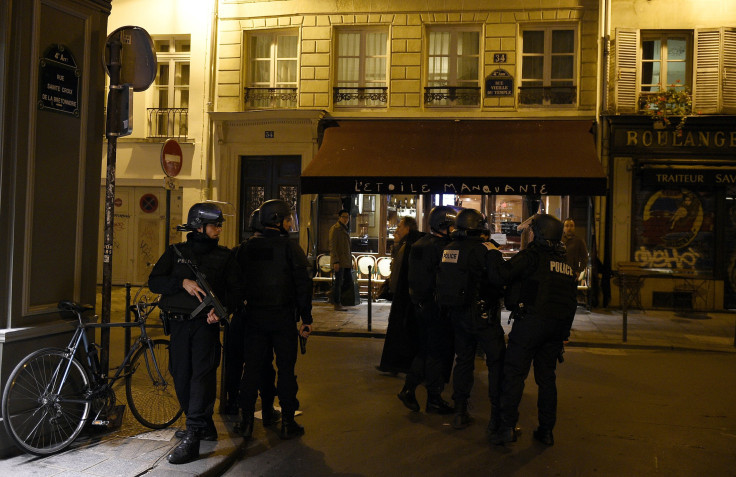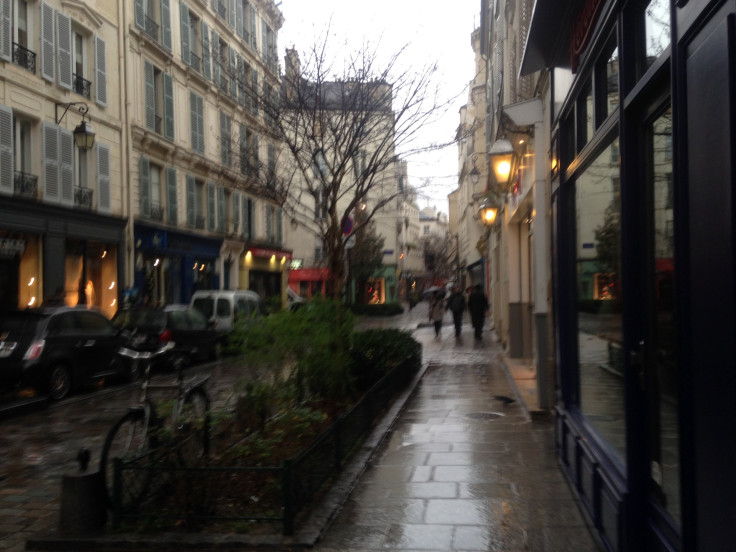Paris Terror Attacks 2015: Jewish Neighborhood Marais Looks To French Solidarity After November Terrorism, Charlie Hebdo

PARIS -- In the heart of the historically Jewish Marais neighborhood here, down a small side street with little car traffic, sits the Agoudas Hakehilos Synagogue. Set back from the street behind iron bars, it is barely noticeable but for the three soldiers discreetly standing guard with automatic rifles slung across their chests in several doorways near the property.
After a series of coordinated terror attacks across Paris last Friday that left 129 dead and the stabbing of a Jewish teacher in Marseille by three men claiming allegiance to the Islamic State group, security was once again ramped up in the Marais and across the city, with several thousand more police on active patrol. The presence of law enforcement was visible as residents prepared for the Jewish Sabbath Friday, and some expressed hope that the recent violence would bring the Jewish community and the rest of France closer together, forming solidarity in the face of a common threat.
“Because of everything that’s happened, this is a place that’s patrolled closely by police and the military,” said Isaac Sellam, 76, a Jewish resident of the Marais. Sellam said that though there had been instances of anti-Semitic graffiti in the neighborhood in the 30 years he'd lived there, he felt that in general the French population was supportive of its Jewish communities. “The government has shown its solidarity with the Jewish people,” he said.
Residents of the Marais are no stranger to the threat of attack. Islamic extremists have long targeted Jews throughout the world, claiming the Israeli-Palestinian conflict as justification. The Marais has seen swastika graffiti and other signs of aggression, as well as rising tensions with the large Muslim population in France. More recently, soldiers have guarded Jewish temples throughout Paris after the Islamist terror attacks in January on the offices of satirical magazine Charlie Hebdo and a kosher supermarket left 12 dead. But with Friday's terror attacks targeting Paris as a whole, the danger that Jews have long known from jihadist terrorism became a threat to all the French, some said.
The chief rabbi of Paris declared his solidarity with all Parisians after the attacks, calling on Jews around the world to unite with France. France has Europe's largest population of Jews, and of Muslims.
“[France must] heal its wounds, recover and move forward in a united way in order to fight against terrorism,” said Rabbi Haim Korsia.

Despite the police presence, the Marais is one of the quaintest neighborhoods in Paris, with falafel shops, kosher butchers and Jewish bakeries lining the cobblestone Rue des Rosiers in the center of the district. In the past several decades the neighborhood has transformed from a predominantly Jewish neighborhood into a trendy hub, where expensive designer boutiques fight for space among the older cafés and Hebrew bookstores.
At night, the streets grow louder and more boisterous, as gay bars and hipster cafés fill with young people. “It’s a neighborhood that’s packed on weekends, with lots of young people in the cafés," said Sellam. "I think they’re drawn to it because of the culture, too, the museums."
Eli Benayoun, 63, a local lawyer who was born and raised in the Marais, said he felt secure while also taking extra safety measures on his own. When asked whether he was afraid the Marais would be targeted next, he talked about his grown daughter who lives in Israel. “The fear here, it’s nothing like in Israel. It’s much harder over there,” he said.
Benayoun took precautions nonetheless to protect his nine other children, the youngest of whom is not yet 2 years old. “I put my children in a Jewish private school, and every day I take them to school and then I pick them up and take them home at the end of the day,” he said.

Residents throughout the neighborhood, both Jewish and not, acknowledged the extra safety measures in place, particularly through a visible police presence that has been expanded following the January murders and then again after Friday's assault.
One school teacher at the Jewish private school associated with Agoudas Hakehilos Synagogue said he felt relatively safe. “It’s more the French, the Europeans that are the target right now,” said the teacher, as he paced outside the school next to an armed French soldier. He preferred to remain anonymous for security reasons.
Sidney Masson, 23, who works in a café in the Marais while trying to break into the electronic dance music scene, said the neighborhood was extremely well patrolled. Masson, who is not Jewish, said he saw a solidarity growing between the Jewish community and the rest of Paris. “What has united us is that it wasn’t only Jews that were targeted by these attacks, it was everyone,” he said.
“These were human losses," said Masson, adding, "We are in solidarity with them, and [these attacks] did not affect just them.”
© Copyright IBTimes 2024. All rights reserved.






















